Psychiatrists and other professionals from Iraq spent five weeks this fall observing American practices in school-based mental health, forensics, trauma care, substance abuse, services for women and children, and chronic psychiatric disability services.
They learned a lot while in the United States but also taught something to their American hosts.
The 24 Iraqis in the program were supported by the Iraqi and Iraqi Kurdistan ministries of health and the U.S. Substance Abuse and Mental Health Services Administration (SAMHSA).
“Everywhere we went, we learned something new,” said Rebwar Ghareeb Hama, M.D., a psychiatrist from Sulaymaniyah in Iraqi Kurdistan, in an interview. “Especially the greater use of psychotherapy.”
In Iraq, mental health care has been carried out historically on a narrow medical model, by doctors and nurses, with heavy reliance on drugs, he said.
“A community psychiatry model is hard to apply in Iraq for several reasons,” added Jamar Omar Tawfiq, M.B.Ch., also a psychiatrist from Sulaymaniyah. Just six psychiatrists serve that city of 2 million people.
Tawfiq and Hama were both part of the group studying trauma services in primary care.
“There is a lack of psychiatrists, psychologists, clinical social workers, and nurses,” Tawfiq told Psychiatric News. “There is also a great deal of stigma and misunderstanding in the general population about mental illness.”
There are 350 clinics in Iraqi Kurdistan. On their return to Sulaymaniyah, the psychiatrists and their colleagues will choose 12 geographically dispersed health centers and teach the primary care staff—usually just one physician, a physician assistant, and a nurse—more about mental illness and its treatment.
“We will train them in trauma care, teach them to talk to the patient, ask if they experienced trauma, then develop rapport and educate the patient,” said Tawfiq. “If a case is severe, the patient will be referred to the hospital's psychiatric department.”
In addition to a shortage of psychiatrists, Iraq also lacks sufficient nonphysician mental health personnel.
“Our biggest problem is training enough nurses, clinical psychologists, and clinical social workers to create the multidisciplinary teams we need,” added Hama.
Looking for Models to Take Home
The Iraqis visiting the Johns Hopkins Bayview campus in east Baltimore studied school-based mental health systems. Nearly 50 percent of Iraqis are under age 18, but there are few mental health professionals in community settings to identify children with special needs or learning disabilities, said Anita Everett, M.D., director of community and general psychiatry at Bayview and the Iraqis' host there.
The visitors sat in on Baltimore public-school classrooms, observed children's mental health services in schools, and talked to principals and other school officials. Their hosts discussed questions such as how to differentiate behavioral problems from learning disabilities, attention-deficit/hyperactivity disorder, or posttraumatic stress disorder.
Eventually, the Iraqis will pass on such knowledge to teachers to help them identify students who need to be referred for services. They were particularly intrigued by an after-school program's therapeutic intervention to combat substance abuse, in which students are bused from their schools to Bayview.
Learning Worked Both Ways
The primary intent of the program was for Iraqis to learn about the most applicable aspects of U.S. mental health services and how to make use of them back in their devastated country.
But something else happened as well. The Americans learned a lot from the Iraqis.
“Our staff benefit from exchanges with our guests,” said Everett. “Those discussions help us understand our systems better. We're not learning techniques, but we are gaining perspective on our services that we get blinded to.”
For one thing, the Iraqis illuminated the fact that much of American psychiatry is focused on the individual.
“In the U.S., we design programs to make patients more independent,” noted Everett. “Many of our patients are disengaged from their families by the time they get to the clinic.”
But in Iraq, even with all its stresses, family bonds remain stronger and can serve as a source of support for patients. For example, one group from Mosul that took part in a similar program in 2008 set up a program in which a family member becomes a paid member of the patient's care team.
“We can look at how the Iraqis try to provide mental health services in a resource-poor setting and learn something about how to work in underserved areas of this country,” said the International Medical Corps's Allen Dyer, M.D., the host for the trauma group in Virginia.
The experience has even sparked some new thoughts on diagnosis and treatment that might be applicable here.
“Perhaps PTSD is not the right description for the trauma faced by people in Iraq,” said Winnie Mitchell, M.P.A., international officer at SAMHSA. “We're thinking of calling it OTSD—‘ongoing traumatic stress disorder’—because the violence continues on and on, and is not a single event. We face the same thing in the U.S. with domestic violence, street violence, and the aftermath of combat. Our providers also need to pay attention to that ongoing experience of trauma.”
The Iraqi groups were based at the National Center for Trauma-Informed Care in Alexandria, Va.; Children's National Medical Center in Washington, D.C.; the Maryland Department of Health and Mental Hygiene's forensic services division at Jessup and Sykesville, Md.; INOVA Fairfax Comprehensive Addictions Treatment Services in Falls Church, Va.; the Johns Hopkins School of Medicine in Baltimore; and the UCLA Integrated Substance Abuse Programs in Los Angeles.
They also visited sites in Boston and Greenfield, Mass., Milford, Conn., Yonkers, N.Y., Philadelphia, and Sacramento, Calif.
“We hope that this exchange will go on to permit the continuing education of psychiatrists and other mental health professionals,” said Hama.


